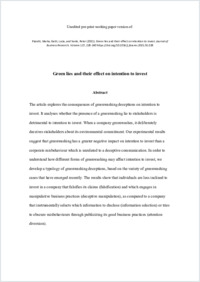Green lies and their effect on intention to invest
- Gatti, Lucia University of Applied Sciences and Arts of Southern Switzerland (SUPSI), Manno, Switzerland
- Pizzetti, Marta Marketing Department, TBS Business School, Toulouse, France
- Seele, Peter Ethics and Communication Law Center (ECLC), Facoltà di comunicazione, cultura e società, Università della Svizzera italiana, Svizzera
- 2021
Published in:
- Journal of business research. - 2021, vol. 127, p. 228-240
English
The article explores the consequences of greenwashing deceptions on intention to invest. It analyses whether the presence of a greenwashing lie to stakeholders is detrimental to intention to invest. When a company greenwashes, it deliberately deceives stakeholders about its environmental commitment. Our experimental results suggest that greenwashing has a greater negative impact on intention to invest than a corporate misbehaviour which is unrelated to a deceptive communication. In order to understand how different forms of greenwashing may affect intention to invest, we develop a typology of greenwashing deceptions, based on the variety of greenwashing cases that have emerged recently. The results show that individuals are less inclined to invest in a company that falsifies its claims (falsification) and which engages in manipulative business practices (deceptive manipulation), as compared to a company that instrumentally selects which information to disclose (information selection) or tries to obscure misbehaviours through publicizing its good business practices (attention diversion).
- Language
-
- English
- Classification
- Economics
- Other electronic version
- License
- Open access status
- green
- Identifiers
-
- ARK ark:/12658/srd1320639
- Persistent URL
- https://n2t.net/ark:/12658/srd1320639
Statistics
Document views: 225
File downloads:
- Seele_2021_jbr: 572
